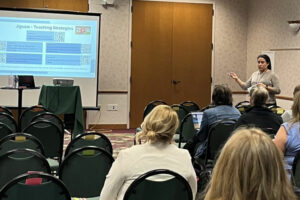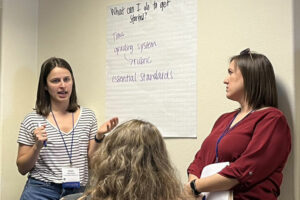
Students in the Mathematics Teacher Leadership graduate cohort presented their work to classroom teachers at the Wisconsin Mathematics Council conference May 1-3 in Green Lake.
Nine students in the cohort gave presentations at the statewide event. (Several students teamed up to collaborate on their projects).
Developing the presentations and submitting them to the state conference was a class assignment, according to DeAnn Huinker, professor of mathematics. Anne Marie Marshall, co-director and co-instructor with Huinker in the graduate cohort program, developed and planned out the assignment to have students submit their presentations to the conference.
“It was really her vision to have them create these proposals for Green Lake,” said Huinker. This is the first time the cohort took presentations to the state conference. A previous cohort created proposals as part of their classwork, but because of the pandemic, the state conference was virtual. The conference is the premiere event for mathematics education in the state, Huinker added, with 150 sessions and nationally known speakers.
Students worked with colleagues and faculty to develop their presentations


The students approached the presentations with excitement and “some trepidation,” said Anne Marie Marshall, a team leader from the Center for Mathematics and Science Education Research.
“So many of them had the opportunity to present in person to their colleagues and other leaders across the state. It’s a huge testament to the students and our cohort program. They are true leaders in their buildings.”
The graduate student cohort has 24 students, all of them currently mathematics classroom teachers. A number of students in the class who had proposals accepted weren’t able to attend the state conference to present because of commitments or budget issues in their districts, according to Huinker.
“We know they were accepted and we celebrate them just as much,” said Marshall.
“I never felt like a leader in the teaching community before, but preparing to present has made me feel like a leader.”
The mathematics teacher leadership program runs for five semesters and the students will graduate in the summer of 2024. Students who complete the program earn either a master’s degree or a graduate certificate in mathematics teacher leadership.
Lauren Feuling, a member of the cohort and a third-grade teacher at Forest Ridge Elementary School in Oak Creek, is excited about sharing what she learned about conceptual understanding of fractions with other teachers at the state conference.
“After digging into it, I found how simple changes to instruction could impact student understanding and knew other teachers needed to know about this too.”
The experience has been “empowering,” she added. “I never felt like a leader in the teaching community before, but preparing to present has made me feel like a leader.”
The students chose subjects they were excited about for their presentations, said Marshall. “This is really not just for them, but also for their students,” said Marshall. “They’re learning and becoming stronger teachers for their kids.”
Accepted graduate student presentations:
| Faith Becker | “What never uses numbers, but always makes sense? Numberless word problems of course!” |
| Elizabeth Butryn | “How to Succeed at Struggling” |
| Jenn Collier | “These Should be the Same: A Discussion on Mathematical Equivalence” |
| Lauren Feuling and Lexi Schmidt Oak Creek-Franklin School District | “Fraction Magnitude: It’s Kind of a Big Deal” |
| Stephanie Gebhard, Sarah Baxter, and Emily Carton | “Watch Your Mouth, We Don’t Use PEMDAS Anymore: Language that is Detrimental to Learning Mathematics” |
| Courtney Gotz Kenosha Unified School District | “The Starting (Number) Lineup” |
| Jacob Lawler | “You, Me, & Your Math Identity. Posing purposeful questions improves math identity in your classroom” |
| Megan McCormick Sun Prairie School District | “Assessment Practices to Empower Students” |
| Erin McReynolds and Amy Baer | “The Equal Sign is not “the Answer” |
| Branden Mueller | “The Power of Unit Fractions!” |
| Samantha Padecky | “Creating a Culture of Mathematics: Stop saying you’re not a ‘math person’” |
| M. Guadalupe Serna Milwaukee Public Schools | “Developing a Mathematical Identity: What it is and what that means for Emergent Bilinguals” |
| Ally Weiland and Mallory Finnigan | “Solving Equations Beyond the Standard Algorithm: Cover It Up, Algebra Tiles, The Equal Sign, & More” |